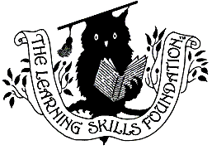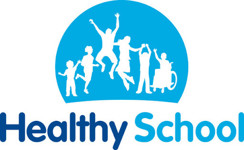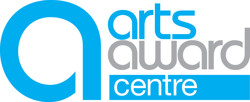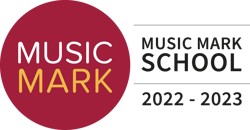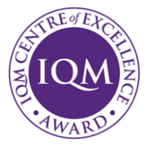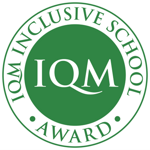- Home
- Key Information
- SEND Information Report
SEND Information Report
SEN Information Report
This information is to inform you about how the staff at Gossey Lane work to support children with additional or different needs. This is reviewed annually to reflect our provision for SEN. This is done collaboratively to collect view points and ideas from all stake holders i.e families, staff and pupils.
Who can I contact about Special Educational Needs at Gossey Lane Primary School?
Mrs Tariq is the Inclusion Leader. She has day-to-day responsibility for reviewing our SEN policy and arranges specific provision made to support individual pupils with SEN, including those who have Education, Health and Care plans. She also helps our children who have physical, medical and speech & language needs.
To discuss your child’s education and needs with Mrs Tariq (Inclusion Lead) please contact the school office to make an appointment. Please note, Mrs Tariq's working days are Mondays, Tuesdays and Wednesdays. If your request is urgent and Mrs Tariq is not available, please ask to speak to a member of the Senior Leadership Team.
Phone: 0121 464 2909
Email: enquiries@gosseylane.academy
What kinds of Special Educational Needs does the school make provision for?
Cognition and Learning
Some children find learning more difficult than others. They may need:
- More time to learn new things and to think about their answers;
- For information to be repeated or presented in a different way;
- Help to hold information in their heads during a lesson;
- For new learning to be broken down into small bits of information.
Examples of specific learning difficulties include: Dyslexia, Dyspraxia and Dyscalculia.
Communication and Interaction
Some children need help to develop their communication skills and learn how to interact with other people. They may need:
- Help with their speech and language skills;
- Help to understand what others mean when they are talking;
- Help to deal with things in the environment that are new, like unusual smells and sounds;
- Help to learn about topics that are new and unfamiliar;
- Help to feel ok about times when things change.
Social, emotional and mental health difficulties
Some children find it hard to manage their feelings and behaviour. They made need help to:
- Follow the Gossey Way
- Understand how they are feeling
- Make friends
- Keep themselves and others safe
- Listen and follow instructions
Sensory and/or physical needs
Some children have a disability which can mean that accessing the school building and the curriculum can be more challenging. They may need:
- Help with their hearing or vision;
- Help getting around the building
- Help with their specialist equipment such as specialised chairs, hearing loops, CCTV monitors, wheelchairs, feeding and special medical equipment, medication, other walking aids etc.
- Help with writing and using handheld equipment such as writing and in PE lessons.
- Help if they have more than one physical disability or medical needs that need a trained person to support with.
What type of provision does the school make and how do they know it works?
Cognition and Learning
Examples of support in our school:
- We use a range of visual and written scaffolds to enable all learners in class.
- We use ‘Language and Literacy’ and ‘Mathematics’ Continuums to set work for children in interventions groups based on their needs.
- All staff use the 5 a day principles to under pin their teaching.
We have teaching assistants who are trained to:
- Support in class, adding to what the class teacher is doing
- Take children out of class to help with things they are finding difficult to learn.
- We have support from specialist teachers and outside agencies to support children with learning needs.
How we check it is working
- We review the continuums regularly and when needed
- Teaching staff meet regularly to talk about every child’s progress and how to support them with their learning needs.
- We use a whole school assessment system to look at data which tells us who needs help.
- We talk to parents, children and agencies regularly to review the progress children are making.
Communication and Interaction
Examples of support in our school:
- All support staff are trained to help children with language needs
- We help children when things change by using transition booklets and visual timetables
- We sometimes teach children new topics and words before they see it in the classroom so they are ready for the new learning.
- We work with the Communication / Autism Team (CAT) to help children who learn in different ways.
How we check it is working:
- We review speech, language and communication targets termly
- Teachers talk to each other about the progress children are making
- The SENCO and the senior leadership team look at what is being provided and how it’s working
- The children are given time to feedback about what works and what doesn’t work for them.
Social, Emotional and Mental Health Difficulties
Examples of support in our school:
- We get advice from Educational Psychologist trained in working with children who have social, emotional and mental health needs.
- We work with Beacon School Support to develop strategies for children with behavioural needs.
- Our Senior Learning Mentor supports children and families in a wide variety of ways.
- Our Senior Learning Mentor provides 1:1 coaching and mentoring sessions.
- We utilise the external suppprt provided by COMPASS Birmingham Mental Health Support.
- Teachers set high expectations for behaviour and have support from school leadership to do so.
- Structured lunchtimes including additional adult support to offer a set routine on a daily basis.
- Use of positive handling plans to ensure that appropriate strategies are used for those children who have additional needs.
- All children have access to Zones of Regulation (in the class), Regulation Stations positioned in school and two sensory rooms.
How we check it is working:
- Everyone at school takes responsibility to support children with Social, Emotional and Mental Health needs.
- Everyone is aware of their duty to report, monitor and plan for the needs of individuals.
- Pupil Progress Meetings includes time to discuss how children are developing, including their social and emotional skills.
- We use monitoring logs for behaviour to manage children who have behavioural needs.
- We use the Strengths and Difficulties questionnaire to measure the impact of support.
Sensory and/or physical needs
Examples of support in our school:
- Our school is made to be as accessible as possible so that children don’t need to tackle stairs or other obstacles (using a lift).
- We have made our schools as safe as possible by adding pegs, rails, disabled facilities (including toilets and shower room).
- We can work with the Physical Difficulties Support Service (PDSS) and Sensory Support for visual and hearing impairments.
- We work with Occupational Therapy and other agencies who give advice.
- We can hold ‘fine’ and ‘gross’ motor skills groups to develop physical development skills.
How we check it is working:
- We carry our risk assessments and reviews of children’s needs regularly.
- We ask outside agencies to review our setting when we have children who have specific needs.
- We consider children’s sensory and physical needs when they move to new classrooms and to new settings.
How does the school identify and assess Special Educational Needs?
At Gossey Lane, all staff are involved in assessing children in order to identify whether a child has special educational needs. We do this by:
Observing children in class, looking at their books and speaking to their teachers about what the child can and can’t yet do.
Using school test results such as the Year 1 Phonics Check, End of Key Stage 1 Assessments (SATs) and assessments carried out termly.
Using information from parents, carers and from gaining the views of the child.
Working with specialist teachers and outside agencies who advise and assess children
Using information from previous schools or settings
If we think that a child has additional needs, we use a graduated approach to finding out what level of support they might need. This is initiated by the use of an Initial Concerns Evaluation (ICE) form, completed by the class teacher.
We will assess the child in more detail, plan how to support them, carry out the support for a period of time and then review how well it has worked.

How does the school teach pupils with SEN?
As a school we are committed to a graduated approach to our SEN provision. We recognised that each child is unique therefore we provide:
- High quality teaching is the greatest lever for improving outcomes of young people. Teachers provide children with a range of scaffolds. This will meet the needs of the majority of children and is our first step in responding to children who have or may have SEN.
- In addition, we also provide a range of interventions which may be carried out in a small group or 1:1. The intervention programmes that we use are dependent upon individual needs.
- Where children have significant needs a more tailored approach is required. eg TEEACH boxes.
Interventions available in school include:
- Precision teaching for reading and spelling
- WellComm (speech and language)
- Social Stories
- Switch on (reading)
- Read Write Inc catch up- Fast Track Tutoring
- Power of 2 (Maths skills)
- Write from the Start (Fine motor skills)
- Speed Up (Fine motor skills)
- Fine and Gross motor skills
- ‘Language and Literacy’ and ‘Maths’ continuums
- Mentoring
- Memory Magic
How does the school make adaptations to the curriculum and learning environment?
Our intent is that SEND pupils have access to a broad and balanced curriculum that provides pupils with the knowledge and skills they need in order to take advantage of opportunities, responsibilities and experiences of later life. School Leaders have high expectations for pupils with SEND, so set aspirational target to challenge pupils and encourage them to take full advantage of future opportunities. To support SEND pupils access the curriculum our learning environments, curriculum content and lesson delivery is tailored to meet individual needs enabling good progress. Our curriculum is underpinned by Rosenshine’s Principles of Instruction which includes, regular opportunities to review learning; receive new learning in small steps; modelling and scaffolding learning; guided practice and independent practise to achieve high success rates. We use the Language and Literacy and Mathematics Continuums to help implement this for SEND pupils. The continuums follow the national curriculum by breaking down the objectives into smaller steps of learning leading to the same outcomes over time. This allows for vital gaps in learning to be identified and taught so the necessary foundations for future learning are secured and pupils make good progress.
We implement the following adaptations to ensure all children’s needs are met using the 5 a day principles as an overarching approach.
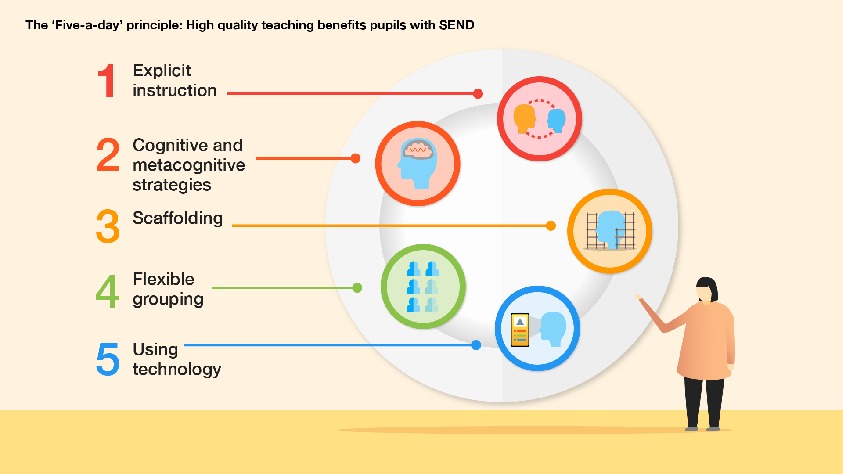
One of the key ways in which we adapt learning for children with SEND is through scaffolding work.
Teachers provide scaffolds in a range of forms for difficult tasks rather lowering expectations. We work on the principle that scaffolding is eventually withdrawn when the children are ready. Scaffolding is temporary and must not be relied upon in the long run.
The teachers consider the component parts of the task and consider the difficulties that children may encounter. Teachers design resources that support these children. Scaffolds are used as a tool to reduce cognitive overload, so pupils can focus on the task e.g. if the objective of the lesson is to develop understanding of vocabulary, then the process of writing can be removed so pupils can focus on the words without becoming stressed about the writing part.
Examples of scaffolds in different subjects could include:
Whole class
Whole class prompts on the IWB/flipchart
Checklists (on tables or washing line)
Washing line or working wall.
Worked examples on the board to refer to.
Explicit modelling- e.g. written and teacher reading aloud. (for the latter element, children need to hear phrased and expressive reading)
For groups or individuals:
Word lists and key vocabulary identified.
Cloze procedure- these are varied such as providing the first letter of the missing word, whole word is missing, phrases missing and the word bank is accessible in the book.
Sentence starters in books in a different colour.
Dual coding
Useful phrases and connectives
Prompts for ideas
Snippets of text for the less able so they do not have to wade through a whole chapter of text.
Page number references so children know where to look for an answer.
We vary the style of questions rather than expecting lengthy written responses eg
Matching
Sorting
Sequencing
Multiple choice
Partially completed examples.
Delivering our curriculum this way, has significant impact on our SEND pupils. They have access to a well-constructed, well-taught curriculum leading to good progress for our pupils. All learning builds towards an end point and enables pupils to show they know more, remember more and are able to do more. We review the children’s individual continuums termly to assess the progress they have made and the impact our curriculum.
How do the school know how much progress is being made by pupils with Special Educational Needs?
At Gossey Lane, our in house assessment and tracking tool- INSIGHT to review the progress children make on a half termly basis. This takes into consideration their prior attainment and where they are in relation to age related expectations.
Children with Special Educational Needs are also tracked using the Birmingham Access to Education Language and Literacy Continuums and Maths Toolkit which tell us in more detail about the progress made as the continuum is broken down into smaller chunks.
Each child on the SEND register has a Learning Plan. This is where targets for each child is set. These are reviewed each term by the classteacher.
These systems are really good at showing us small steps of progress for children with additional needs so we know exactly how best to help them.
What support do the school offer for improving emotional and social development?
We provide support for children to improve their emotional and social development in the following ways:
- Children with SEN are encouraged to be part of the Pupil Leadership Team
- We are a UNICEF Rights Respecting Gold Award school
- Zone of Regulation are a feature of all classrooms to enable pupils to identify feelings or emotions and use the agreed tools to regulate.
- The school makes use of regulation stations and two sensory rooms for children who need support to regulate.
- Talking passes are given to children to give them an opportunity to speak to adults they feel most comfortable with
- Mentoring from the Senior Learning Mentor
- Parent support on strategies from the Senior Learning Mentor
- Accessing Beacon School Support for further advice and strategies which are available to both school and parents
What extra-curricular activities can a pupil with Special Educational Needs access at school?
We believe that all children are entitled to a broad and balanced curriculum. This includes access to fun and stimulating contexts and extra-curricular activities.
All children, including those with SEND can participate in school clubs. Examples of such clubs may include: football, multi-skill sports, revision, gymnastics, cooking and breakfast club. Different school clubs are run at varying points throughout the year so may differ from this list.
Gossey Lane has a number of children who have physical and sensory needs. For some children with these needs, it’s necessary to seek and follow the advice of medical professionals about how they may access our sports clubs. We make every effort to ensure children with SEND can access as many of these clubs as possible.
When booking a trip, staff will consider whether all children can access and take part in the activities. Reasonable adjustments will be made to ensure SEND children are not excluded from such trips. If it is not possible to make appropriate adjustments it will be considered whether or not the trip goes ahead.
What training do staff at Gossey Lane have in relation to pupils with Special Educational Needs?
Gossey Lane make sure that all of our staff are well trained and have regularly updates to their training. The following table shows the training that all staff and specific staff currently have:
All Staff:
- Level 1 AET Autism Training
- NHS Allergy Training
- NHS Asthma Training
- NHS Diabetes Training
- NHS Epilepsy Training
- Read Write Inc phonics
- Supporting Speech, Language and Communication – Knowledge, Skills and Universal Provision
- WELLCOMM Training
- Team Teach
- TIAAS
Specific Training for some staff:
- Paediatric First Aid Training (TAs)
- The Equality Act Training
- Educational Visits Training
- Rights Respecting Training
- Positive Handling in Schools
- Restorative Justice
- Spurgeons Young Carer Training
- Beacon School Support Social Skills
- Speech Sounds and Pronunciation (SALT Champions)
- Occupational Therapy Programmes (OT Champions)
- PSS Precision Teaching for Reading and Writing (TAs)
How do the school get more specialist help for pupils if they need it?
In our school, if we feel a pupil needs more specialist help, we can work with the following people:
Agency or Service |
Who they work with |
How school can get in touch with them |
|
Educational Psychology Service (EPS) |
Children with complex needs and where an application for an Education, Health and Care Plan assessment is made |
School have an allocated Educational Psychologist who Mrs Tariq is in regular contact with. Written parental consent is required. |
|
Pupil and School Support Service (PSS) |
Children who are working below the expected level or who have cognition and learning difficulties |
We have a PSS Teacher who visits regularly. Mrs Tariq will speak with parents if they feel a PSS teacher should work with individual pupils and written consent is required. |
|
Communication Autism Team (CAT) |
Children who are being assessed for or already have a diagnosis of autism or social communication difficulties |
We have an allocated worker who we can contact after a referral has been made to the team. Parental consent is required. |
|
WMSLT – Senior Speech and Language Therapist (SALT) |
Children who are having difficulty with speech, language or communication. This service also works with all staff providing training to develop universal provision. Three TAs have also received more in-depth training and are known as the SALT Champions. They work closely with the therapist to enhance our targeted and specialist provision for specific pupils. |
This service has been commissioned by Washwood Heath Multi Academy Trust. School can contact the therapist directly for support and advice. Where an in-depth assessment is required, a referral form with parental consent is required. |
|
WMSLT – Senior Occupational Therapist (OT) |
Children who are having difficulty with self-care, fine and gross motor skills and sensory processing. This service also works with all staff providing training to develop universal provision. Two TAs have also received more in-depth training and are known as the OT Champions. They work closely with the therapist to enhance our targeted and specialist provision for specific pupils. |
This service has been commissioned by Washwood Heath Multi Academy Trust. School can contact the therapist directly for support and advice. Where an in-depth assessment is required, a referral form with parental consent is required. |
|
Beacon Support |
Children with Social, Emotional and Mental Health needs. |
Beacon Support provide an allocated behaviour specialist who gives advice and works directly with pupils and their teachers. Parental consent is required. |
|
School Nurse |
Children with medical needs and their families. |
We can make a referral to the School Nurse for support in writing Care plans and alert cards for children with diagnosed medical conditions. Parental consent is required. |
How are parents of our pupils with Special Educational Needs involved?
Gossey Lane Academy have an open door policy and we are always available for parents to contribute to their child’s education.
Our website has lots of information about our curriculum and the support children can get. In addition to this website information, we offer our parents:
- Regular meetings with the Inclusion leader during parents’ evenings;
- Parents are invited to reviews of provision where appropriate
- Meetings with the school’s Family Support worker or Learning Mentor where necessary
How are pupils with Special Educational Needs involved in their own education?
We encourage children to become independent learners. We involve children in a variety of ways, including:
- ‘one-page profile’ to help them and their teachers understand their needs and opportunity to assess their leaning
- visual timetables which help children understand what they need to do;
- pupil surveys to collect the children’s views on their learning
If a parent of a child with Special Educational Needs has a complaint, how is this dealt with?
If you are a parent of a child at Gossey Lane who has Special Educational Needs, and there is something which you think is not quite right, please contact the class teacher in the first instance. If you continue to have concerns then contact Mrs Tariq (email enquiries@gosseylane.academy or 0121 464 2909).
We would hope to have addressed your concerns in the first instance, however if unresolved the school office can arrange an appointment with the Headteacher.
How does the governing body ensure that Gossey Lane are meeting the needs of pupils with special education needs?
The young people advocate is Manju Chadda and Mrs Tariq meets to discuss provision for pupils with special educational needs. Following this meeting, Ms Chadda will report back to the Chair Advocate about her findings and this is recorded in the Headteacher's report to the Education Standards Committee. Representatives from WHMAT also take part in SEND Audits, where they observe lessons, talk to children, carry out book reviews and discuss the provision with Mrs Tariq.
Who are the support services that can help parents with pupils who have Special Educational Needs?
Name of Support Service |
How they can support parents |
How you can contact them |
| Autism West Midlands | Support and advice is given and opportunities to meet regularly |
Telephone: 0121 450 7575 Website: Austism West Midlands |
| SENDIASS | The Local Authority’s impartial advice and support service | Telephone: 0121 303 5004 E-mail: sendiass@birmingham.gov.uk |
| Forward Thinking Birmingham (including CAHMS) |
A range of services and facilities focussed around the individual needs of 0-25 year olds. 24/7 access to mental health crisis support. |
Telephone: 0300 300 0099 Website: Forward Thinking Birmingham Write: Access Centre, 5th Floor, 1 Printing House Street, Birmingham, B4 6DF |
How do the school support pupils with Special Educational Needs through transition?
When a child with special educational needs start at Gossey Lane, we:
- Meet with them and their parents to ask and answer questions about their needs;
- If necessary, provide a transition book with photos and information about their new school;
- Arrange visits to the school and any workshops that are appropriate prior to their start date.
When a child with special educational needs moves into a new class at Gossey Lane, we:
- Can give the child a transition book so they have information and pictures about their new classroom and teachers;
- Talk to the child and their family about any changes and how to support at home;
- Introduce the child to their new class and teacher well before their transition.
When a child with special educational needs leaves Gossey Lane in Year 6, we:
- Work with the child’s new school to make sure they have a transition which is as easy as possible for them;
- Talk to key staff at the new school about the child’s needs and hold a review meeting if needed;
- Help to arrange visits to the new school if required and appropriate to do so and a member of staff would attend the visits where necessary
How can parents find the Local Authority's local offer?
Birmingham City Council has a website which has up-to-date information about the range of services provided for children with Special Educational Needs. You can access the Birmingham Local Offer by visiting the following website:
Local Birmingham OfferAs we are aware, some of our families live on the borders of Solihull. This doesn’t affect the provision we provide in school or our access to Birmingham school support services. However, it may mean that external assessments via the NHS or applications for Education, Health and Care Plans are processed through Solihull services, which differs slightly to Birmingham’s processes. If you are a Solihull resident, you may also wish to view Solihull’s Local Offer by visits the following website:
